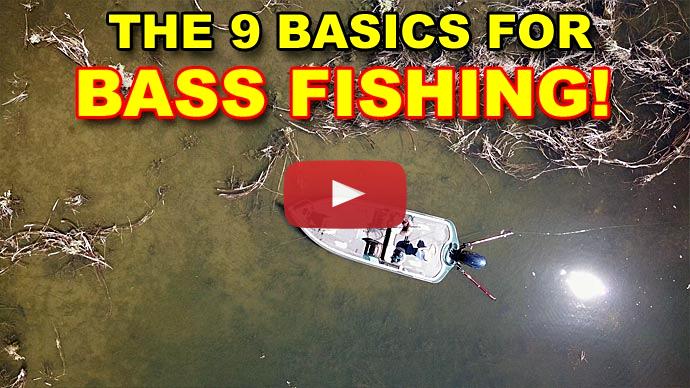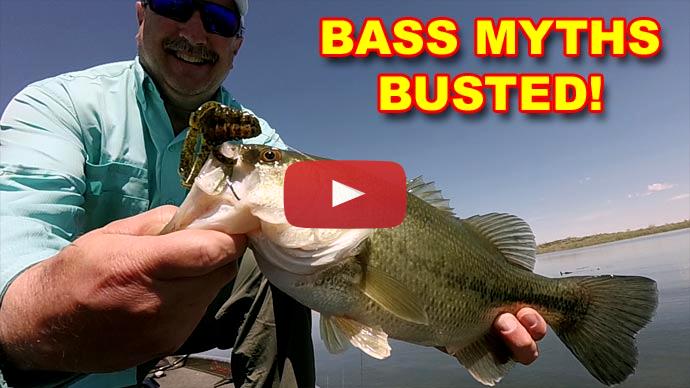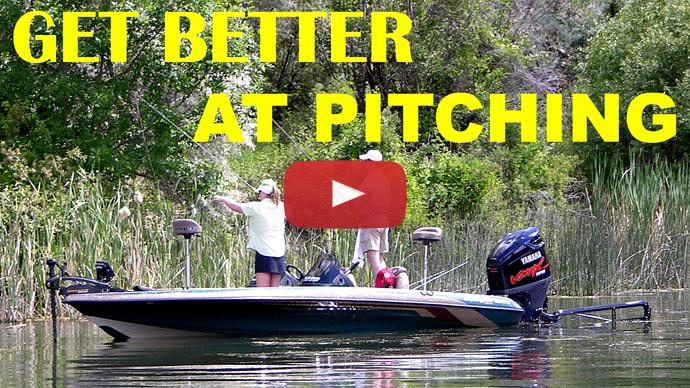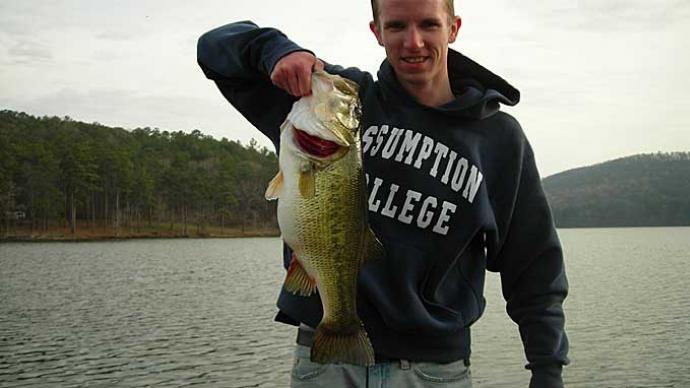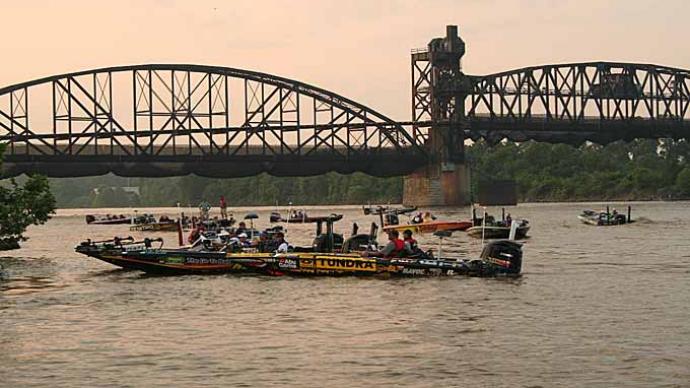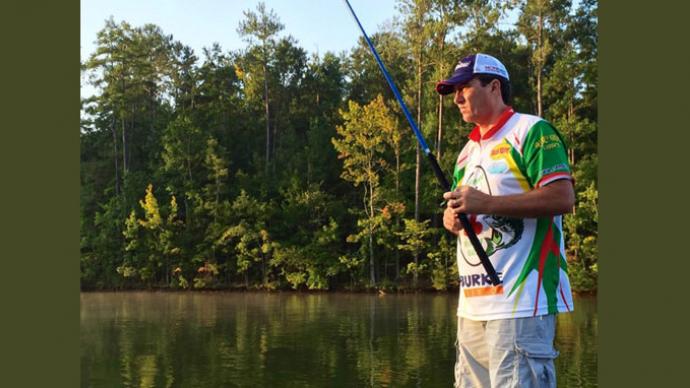Glenn: I got one more question for you. And this is pretty universal regardless of what your skill level you're at, whether you're just starting out or say if you've been in tournaments for a while and you still trying to getting better. And that question is, how do I get better at bass fishing? What kind of advice can you give to somebody who's asking that?
Ott DeFoe: That to me is really a pretty easy one. The single biggest thing is to go fishing every opportunity you get, and to always keep an open mind when you are out there fishing. And if you have that crazy thought that says, "I'm throwing a worm and I need to tie on buzz bait." Tie on buzz bait because there's something in your gut, a natural intuitive instinct that told you to try something different. And if it's wrong, you tried it, you won't regret having tried it. But if you don't try it, and then you go home where you just didn't catch any fish dragging your worm around, you're going to go back and say, "Well, I really wish I would have tried that buzz bait today." So always just listen to that gut when you're learning, when you're trying to become a better angler because you'll have those times when you have a thought, you toss something else on and your very first cast, you catch a bass with it. And that's going to give you confidence to always trust your gut and whatever those conditions are telling you to do and whatever knowledge you have that you've read or you've watched or whatever it may be, that once you have that thought, that you'll trust it and more times than not that's going to help you.
Gerald Swindle: To get better at anything you have to challenge yourself to learn something new and do something out of your comfort zone. If you're comfortable fishing a worm and that's all you ever do, that's good as you're going to get. Challenge yourself to learn to throw something different. Throw a spinner bait. When you feel comfortable with that, go tie on a chatterbait, when you get comfortable with that, tie on a square-up crankbait. Every time you get comfortable with something and you feel like you've kind of got the hang of it, challenge yourself to learn one more technique, and one more technique, because the more you learn, the more you catch.
Glenn: The more variety more... Don't be a one trick pony is what i'm hearing.
Gerald Swindle: Right. You want to have several tricks in your hat and you wanna be able to use them. And then, once you get perfected of those techniques, you will learn that when you see those situations occur on the water, you say, "This is the perfect situation for crankbait," tie it on you'll be successful.
Kevin VanDam:Well, today there are so many resources available. I mean, since the advent of the internet and YouTube channels, things like that, you can literally research and find out about all these new lures and techniques and how to fish them. You know, I've done tons of videos on,, you know how to fish different baits or things like that, or different scenarios, how to use your electronics and all that. The bottom line is, is there's a ton of information out there, and that's great, but you still have to go out and apply it. So there's just no substitute for time on the water. You can be an armchair expert, you can learn all about how to fish a drop shot or whatever, but until you actually go out and do it, you're not going to be an expert at it. And that's what it takes, you got to go out, if you want to learn something new, to go out and focus on that technique or that bait and don't do anything else. That's the best way to learn something new, it's just just going out there and focus on it.
Brandon Palaniuk: The number one thing that never changes is time on the water. No matter your skill level, where you're at in the country, how old you are, there's no substitute for time on the water. And you can't' only go on the days that are nice. Like, you can't only go on sunny days, you can't be a fair weather fisherman. Because if you do that, then you're only training yourself to catch fish under those conditions. And so for like us as tournament anglers, we don't get to pick the weather that we fish under, right? We just get to pick the dates that we fish and whatever mother nature throws at us for whether we have to adapt to. And so I always encourage people to go fish on the nastiest days. If you have an off day and you have the chance to go fishing, go do that. Because what happens is, the more experience and more time you have on the water, the faster that light bulb goes off. And so when you see those conditions again, and you see those variables, it's just like a math question. You're adding this and you're subtracting this and eventually, you have this equation to say, "This is what I need to do. This is what I need to throw, this is where I need to go." And you can only get that by time on the water, because everyone's going to have their own little personal twist. So if you want to get better, no matter what skill level you are, you just need to spend time on the water. Even if it's on the bank, it doesn't have to even be in a boat, you just need to spend time on the water fishing.
Edwin Evers: My advice would be to fish with as many different people as you can. No matter how good or bad you think somebody may be, you can learn something of everybody. If I went fishing with you tomorrow, Glen, I'm going to learn something of you, you're going to learn something of me. And it may be, you may learn from me, "Hey, I sure don't want to do it that way, the way Ed was doing it," but you're still learning something. The more people you can fish with, the more things you can learn, you know. Sign up in a club or something like that where you can fish with multiple people. The more time you can spend on the water, obviously, you're going to get much better. When it all comes down to it, it's just bass fishing. So many times we try to make it so complicated, and it's really not.
Glenn: Always be learning about something new.
Edwin Evers: Always. Always, always. If you're if I'm talking to a tournament angler here that's maybe good with this technique or that technique, for me, I was really bad at jerkbait fishing at one point in my career, I was really bad with a spinning rod, I wouldn't even carry one. So I really worked at honing my skills with those baits, and that's all I'd fish with. At one point, my career I was horrible in Florida. I'm still not very good in Florida, but I spent a lot of winters down there trying to learn it back in my single days to become better in Florida. So you can take it as far as you want to, but make yourself get better at those things, you know, offshore fishing.
One of the things I always tell anybody is just drop your jig over the side of your boat below the trolling motor. Look at the size of your jig on your Lowrance, then that'll really tell you what size of everything else you need to look for. If you're struggling with offshore fishing, get it all, get the rest of everything else out of the boat. Get that shallow spinner bait, that shallow square bill, put your Carolina rig or football jig, deep diving crankbait in your boat to where you don't have anything to fall back on, you know, after you've been out there for two hours and you hadn't had a bite. But, you know, I've always said with that offshore fishing, and we're kind of going off on a tangent here, but I'll find them with my electronics before I ever make a cast. I mean, you will see me go to an offshore event and I will be behind the wheel of that NITRO 12 hours of the day, you know, because I have that much confidence in my electronics, and when I see them on my electronics, that's when I'll turn around and fish. So many people fish all the way around a point, which may take an hour. I'm going to idle that entire point, waypoint to a couple of groups I see here, a couple of fish I see, then turn around and go catch those fish.
Keith Poche: There's really only one answer and a lot of people may not want to hear this answer, but I had to live it. I had to go through a nasty experience. It's just time on the water. It's just, you know, research as much as you can research and put in the time. You can't take away from time on the water. Time on the water and experience situations and patterns will definitely grow your knowledge efficient and how to catch them, what not to look for, what to look for. It's like any other sport, with basketball, football. I mean, we went to practice every day during the week. We lifted weights, I mean, you don't just show up and are naturally good. There's techniques, there's things you have to do, and the only way to do that is to practice. And that's what it takes to go out. If it's just learning how to skip underneath a dock, or how to throw a crankbait or whatever, throw a, you know, a walking topwater bait, going out there and actually doing it and doing it and doing it until you get good at it, that is 100% the only way you're going to get better.
Chris Zaldain: How do you get better at any other sport? Honestly, you practice. You practice, practice, practice. And man, I remember growing up in high school after sixth period, I'd go out in my little float tube and just work on fishing. And actually, to get to more specific, I remember growing up swim day fishing, I would go out in my kick boat float tube and only bring one rod, one reel, one lure, and you were absolutely forced to work on that particular technique. So how do you get better at a particular technique or how do you get better at bass fishing in general? Is go out there with one rod, limit yourself to one rod, you're forced to learn that specific technique. It'll make you a better fisherman.
Glenn: That's perfect advice. I think we've all of us have done that. That's a great way of learning.
Chris Zaldain: Yes. Absolutely
Glenn: Thank you so much for your time. I appreciate it.
Chris Zaldain: Thank you, Glenn.

